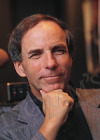HOME | ABOUT US | MEDIA KIT | CONTACT US | INQUIRE
HOME | ABOUT US | MEDIA KIT | CONTACT US | INQUIRE

Everyone who has ever met the aptly named Loy Edge—and that is just about everyone in Kansas City—will agree on one word to describe him: Edge is a character. For all its virtues, our beloved town is rather short on characters, especially home-grown characters. Happily, Edge—Shawnee Mission East ‘74—helps fill that void.
Starting this spring, Edge will be touring small-town Missouri and speaking to independent bankers. Edge, who has been consulting with independent banks for more than 30 years, is embarking on an ambitious project called “Great Towns USA.”
Edge’s goal is to establish these banks as the nucleus of an entrepreneurial effort to attract people and businesses weary of urban life to small-town America. He envisions creating interconnected clusters of amenities—from health-care facilities to hunting lodges—that would help position these towns as distinctly competitive entities in the regional market.
Yes, Edge knows that regional councils serve a similar function, but he plans to put an entrepreneurial, well, “edge” to his efforts. This includes aggressively linking these small-town hubs, once developed and packaged, to big-city investors.
Edge knows something about entrepreneurship. Years back, he braved the rough and tumble of Westport to launch such noteworthy establishments as Buzzard Beach and Harry’s Bar and Tables, among others. In the course of his career, he has done yeoman’s work in helping make Mid-America safe for cigar smokers. He is not afraid of a good time. Small-town Missouri could use his touch.
About 20 years ago, as a side venture, Edge moseyed on out to Hollywood and quickly established himself as a successful, prize-winning voice talent. He even appeared in three movies and was featured in one. Family matters brought him back to Kansas City, but he still dabbles. As I said, Edge is a character.
Edge had been plotting his Great Towns project for some time, but boy did the events of 2020 put a giddyap in his step. His original conception was largely benign, but he would be a fool to deny the potential “bug out” factor in the growing appeal of small towns. In the last year, people have lost confidence not only in cities—little new there—but also in suburbs.
Rarely at a loss for words, Edge struggles to find a way to describe the “complexity industry” now strangling metropolitan areas. As he sees it, people are weary of seeing the dispersal of funds “estranged from market needs” and wary of the people who are dispersing them.
Small towns, once seen as suffocating, are increasingly seen as liberating. Many Americans this past year were shocked to see how eagerly public officials in metropolitan areas seized whatever power they had at their disposal to control elements of civic life that, until very recently, were thought of as being beyond state control.
In general, rural areas resisted the rush to regulate. With each passing day, their resistance seems to have been the more prudent course—emotionally, spiritually, and certainly economically.
As a result, Edge argues, there is a “megatrend of people wanting to re-experience basic American values,” and a growing belief that those values can still be found in small-town America. Having driven across Missouri a few times this summer on Route 36—no more I-70 for me—I get what Edge is aiming at.
I planned my trips, in fact, to stop for lunch at the Becky Thatcher diner in Hannibal. For me, this was a journey back in time, not so much to the America of 1850—who wants 1850?—but to the America of 2019, all the amenities and few of the anxieties.
If there has been an upside to COVID-19 and the mania it spawned, it is the growing realization for many people that they can work from just about anywhere. Lots of people have already made the move. My friends tell me, for instance, that the Lake of the Ozarks had a great summer and is enjoying a real-estate boom. People are bugging out of the Chicagos and the St. Louises, some of them permanently.
Greater Kansas City, however, remains more stable than most. Indeed, I know people who have moved here from New York City for sanity’s sake, and I am encouraged to see emerging signs of life on the city’s most valuable resource, the Country Club Plaza, after last summer’s unrest.
As much as I have enjoyed living within walking distance of the Plaza, however, I cannot say that I enjoy living in helicopter-hovering distance. Another summer of that madness will make Edge’s project much more viable.
That said, pitching independent banks is never going to be easy. This I know from experience. Nearly 30 years ago, a friend who had just retired from the military approached me with an idea he had picked up doing intelligence work. He wanted me to handle the creative end of the project, and he would handle the architecture.
I went with him on a couple of sales calls to independent banks in the outlying areas. He thought such banks could most benefit from the service and were capable of making decisions. The pitch went something like this.
“There is a phenomenon the Defense Department helped develop called the World Wide Web. We think you could profit greatly from having a site on the web—a “web-site” as it were—and we can design that site and get you up on the Web.” These guys were looking at their watches within five minutes. Web site? We closed not a single sale.
Knowing Loy, I am confident that he can close a sale better than we could. And although I wish him well, I am hoping 2021 will make his job a little bit tougher than 2020 did.
Leave a Reply